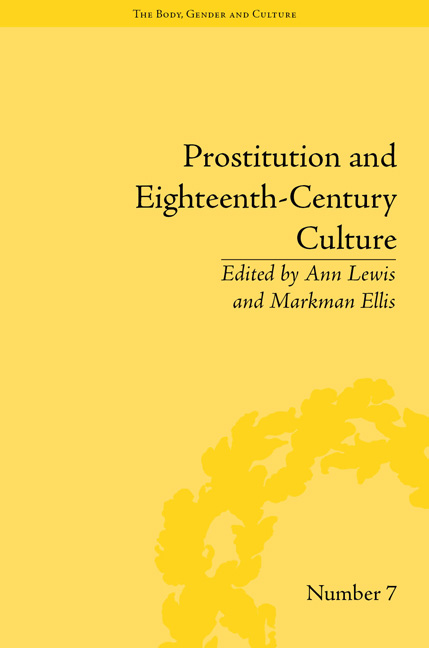Book contents
- Frontmatter
- CONTENTS
- Acknowledgements
- List of Contributors
- List of Figures and Tables
- Introduction: Venal Bodies – Prostitutes and Eighteenth-Century Culture
- Part I (Auto)Biographical and Classificatory Fictions: Madams, Courtesans, Whores
- 1 Classifying the Prostitute in Eighteenth-Century France
- 2 In Her Own Words: An Eighteenth-Century Madam Tells Her Story
- 3 ‘All the World Knows Her Storie’: Aphra Behn and the Duchess of Mazarin
- 4 Marie Petit's Persian Adventure (1705–8): The Eastward Travels of a French ‘Concubine’
- 5 ‘A First-Rate Whore’: Prostitution and Empowerment in the Early Eighteenth Century
- Part II Visibility and Theatricality: Fiction, Image and Performance
- Part III The Magdalen House: Marriage, Motherhood, Social Reintegration
- Part IV Wider Perspectives: Constructing the Prostitute in Social History
- Notes
- Index
4 - Marie Petit's Persian Adventure (1705–8): The Eastward Travels of a French ‘Concubine’
from Part I - (Auto)Biographical and Classificatory Fictions: Madams, Courtesans, Whores
- Frontmatter
- CONTENTS
- Acknowledgements
- List of Contributors
- List of Figures and Tables
- Introduction: Venal Bodies – Prostitutes and Eighteenth-Century Culture
- Part I (Auto)Biographical and Classificatory Fictions: Madams, Courtesans, Whores
- 1 Classifying the Prostitute in Eighteenth-Century France
- 2 In Her Own Words: An Eighteenth-Century Madam Tells Her Story
- 3 ‘All the World Knows Her Storie’: Aphra Behn and the Duchess of Mazarin
- 4 Marie Petit's Persian Adventure (1705–8): The Eastward Travels of a French ‘Concubine’
- 5 ‘A First-Rate Whore’: Prostitution and Empowerment in the Early Eighteenth Century
- Part II Visibility and Theatricality: Fiction, Image and Performance
- Part III The Magdalen House: Marriage, Motherhood, Social Reintegration
- Part IV Wider Perspectives: Constructing the Prostitute in Social History
- Notes
- Index
Summary
In early February 1709, Marie Petit, aged about 35, entered the Hôpital du Refuge, a prison for ‘wayward and disorderly women’, including prostitutes, in Marseille. She would regain her freedom only in 1713, after several times the normal period of incarceration imposed on local women for sexual misconduct. But Petit was no ordinary prostitute, if she was one at all. The city councillors had escorted Petit to the Refuge upon her disembarkation from a royal frigate, L'Entreprenant, just arrived from Constantinople. A former manager of a gambling establishment in Paris, Petit had spent the previous four years travelling by sea and overland between France and Persia, initially in the company of Jean-Baptiste Fabre, a bankrupt Marseille businessman and Louis XIV's extraordinary ambassador to Shah Sultan Husayn. Petit's story thus presents us with a fascinating historiographical problem: as an independent or masterless woman, she managed to travel widely and have various adventures, but nonetheless, her travels and adventures were registered by her enemies at home as sexual adventurism and troped as prostitution.
Upon Fabre's death under mysterious circumstaces in the Persian provincial capital Erivan in June 1706, Petit took over as unofficial ambassador, passing herself off as a French princess. Charles de Ferriol, the French resident ambassador at Constantinople, alarmed by reports of Petit's scandalous conduct, had dispatched his undersecretary Pierre-Victor Michel to Persia to ensure her swift return to France by whatever means. Michel ultimately obtained his credentials as Louis XIV's official ambassador and completed the mission.
- Type
- Chapter
- Information
- Prostitution and Eighteenth-Century CultureSex, Commerce and Morality, pp. 59 - 70Publisher: Pickering & ChattoFirst published in: 2014



